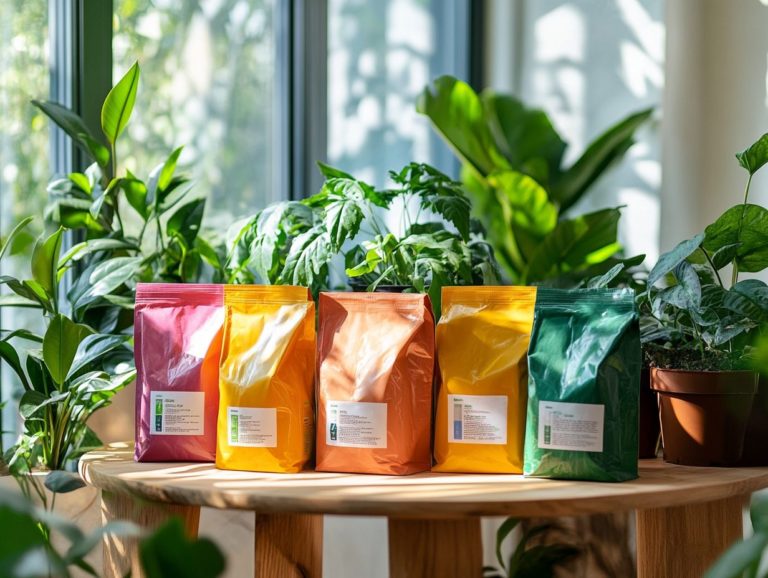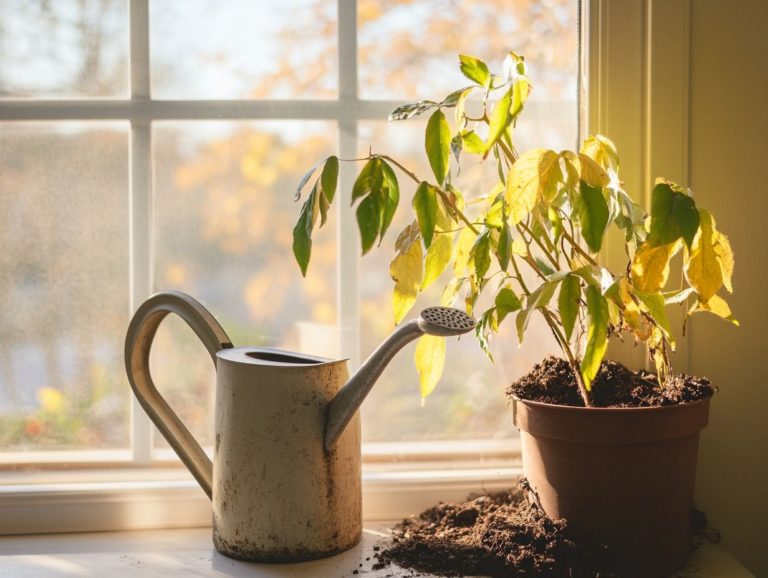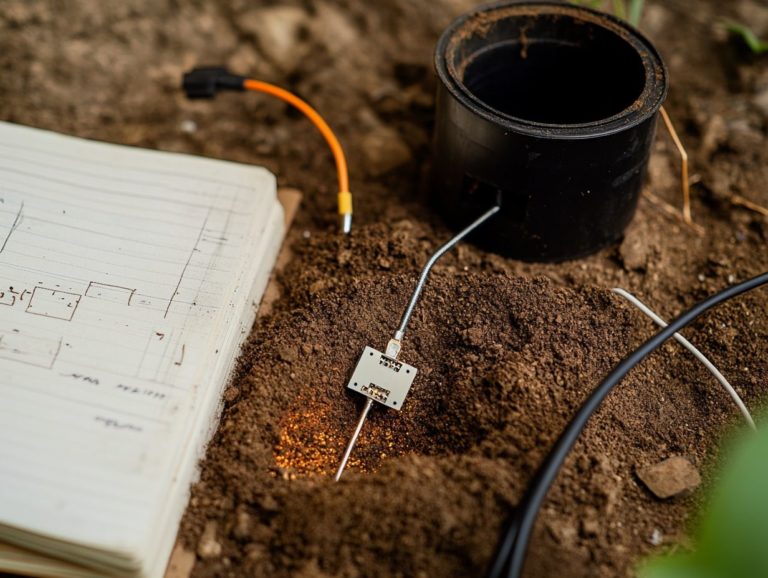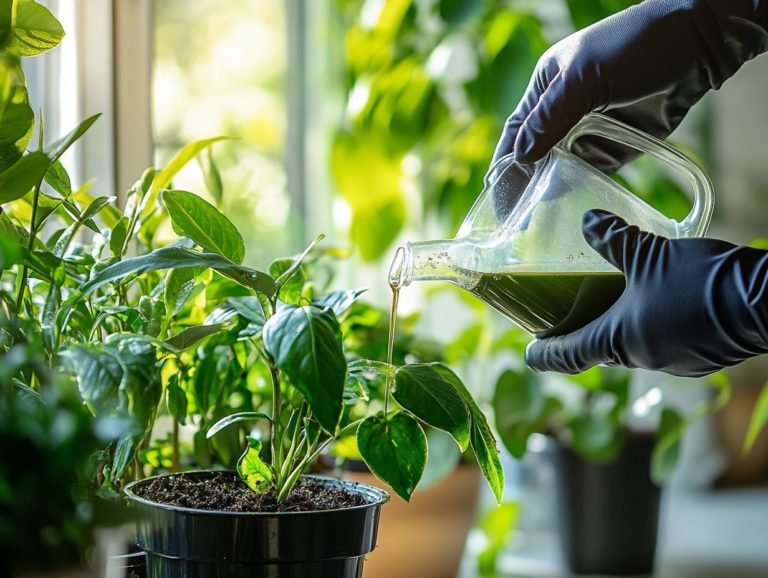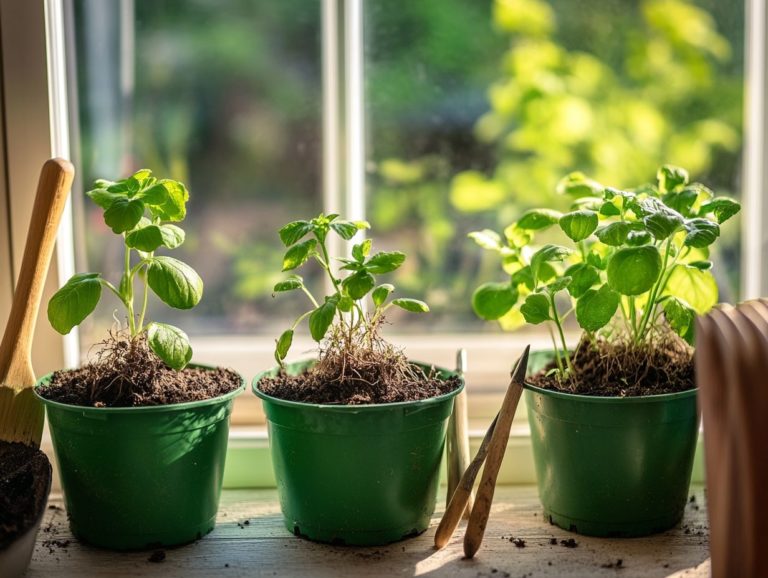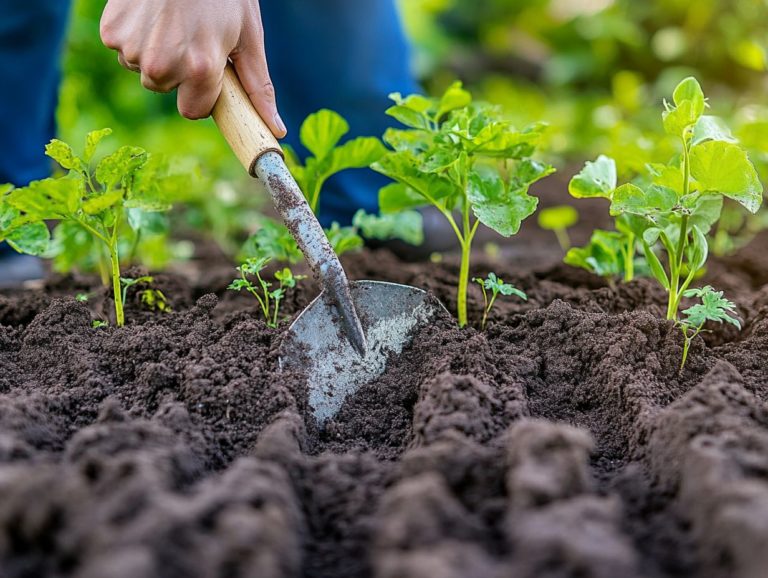How to Test Soil Quality for Indoor Plants
Indoor plants require more than mere light and water; the quality of their soil is vital for their overall health and growth, which is crucial in plant care.
By understanding soil quality, you can pinpoint and address common issues related to houseplant care that may be stunting your plants’ development.
This guide will delve into the significance of soil quality, highlight the signs of poor conditions, and outline effective soil testing methods.
You will also gain insight into interpreting test results and enhancing your soil mix, setting the stage for your plants to thrive in all their vibrant glory.
Contents
- Key Takeaways:
- Understanding Soil Quality for Indoor Plants
- Signs of Poor Soil Quality
- Methods for Testing Soil Quality
- Interpreting Soil Test Results
- Improving Soil Quality for Indoor Plants
- Frequently Asked Questions
- Why should you test your indoor plant’s soil quality?
- How can I test the pH level of soil for my indoor plants?
- What are the signs of poor soil quality for indoor plants?
- Can I use the same soil for all my indoor plants?
- How often should I test the soil for my indoor plants?
- What can I do to improve the soil quality for my indoor plants?
Key Takeaways:
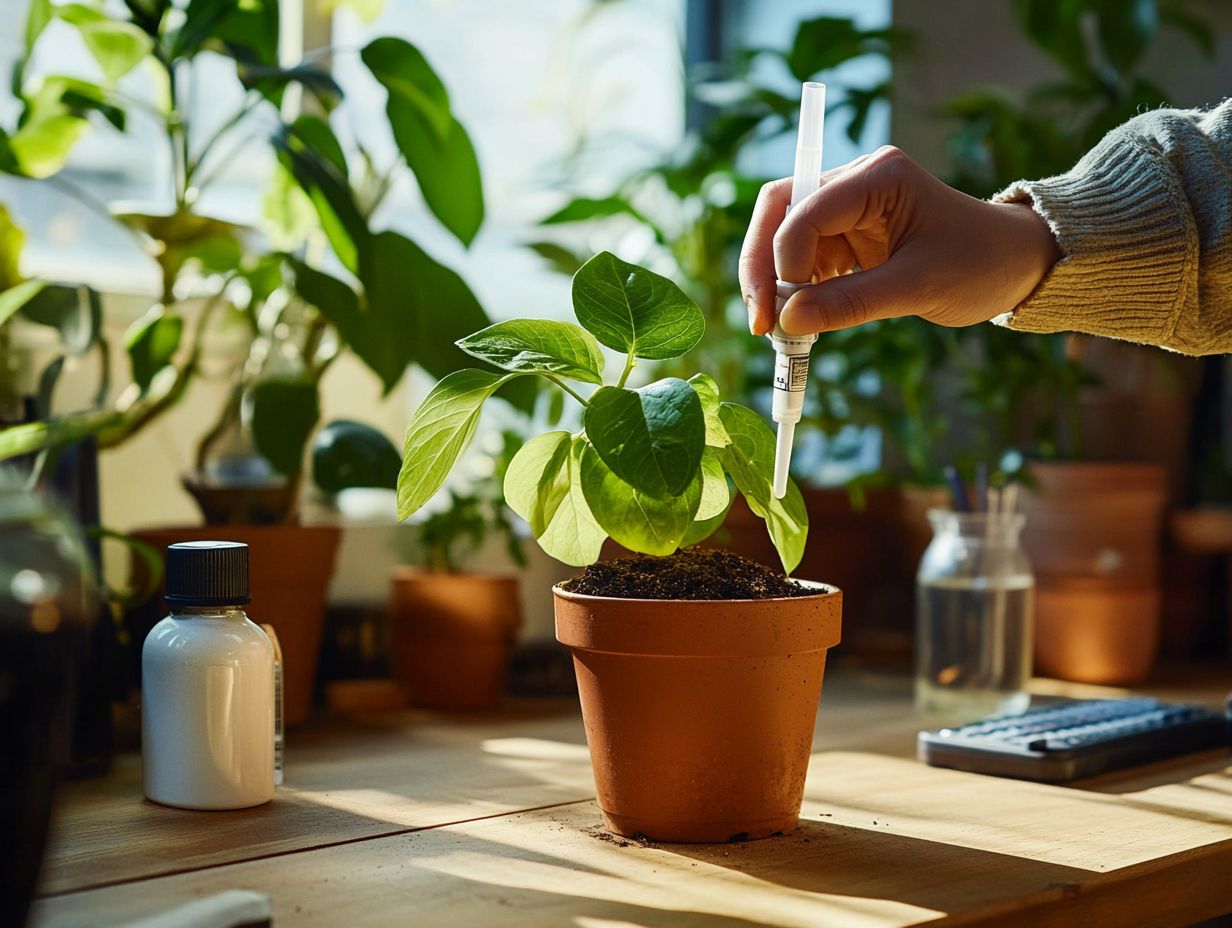
- Proper soil quality is crucial for healthy indoor plants.
- Signs of poor soil include wilting leaves and stunted growth.
- Testing your soil can guide improvements for better plant care.
Understanding Soil Quality for Indoor Plants
Understanding soil quality for your indoor plants is essential for their survival and growth. It directly influences nutrient absorption and moisture retention, which are vital in plant parenthood.
High-quality soil offers the perfect balance of air, water, and nutrients required for a variety of houseplants, including favorites like the candelabra cactus and the African milk tree. This balance is essential for maintaining a vibrant indoor garden.
When you optimize soil conditions in your indoor garden, you create an environment where your plants can truly thrive. This leads to lush growth and a more rewarding gardening experience in your home gardening efforts.
Importance of Soil Quality for Plant Growth
Soil quality is essential for your plants growth. It directly influences nutrient levels and the effectiveness of fertilizers, impacting overall plant health.
When nurturing healthy indoor plants, you’ll find that the quality of the soil is crucial for promoting strong root development and ensuring optimal moisture retention.
A well-balanced mix like adding peat moss for aeration or vermiculite for moisture can dramatically improve the soil structure, which is key for a thriving container garden. Regularly testing the pH levels (a measure of acidity or alkalinity) using a pH meter is vital to keep them in the ideal range for your specific plants.
Amending the soil with compost boosts nutrient availability and introduces beneficial microbes, creating a thriving ecosystem that supports vigorous plant growth and enhances gardening methods.
Signs of Poor Soil Quality
Recognizing the signs of poor soil quality is crucial for nurturing a flourishing indoor garden. Symptoms like wilting leaves and stunted growth can serve as clear indicators of underlying problems, such as overwatering or nutrient deficiencies, greatly affecting plant survival.
By paying attention to these subtleties, you can take proactive steps to enhance your plant’s environment and ensure their sustained vitality, thus improving your gardening confidence.
Identifying Common Issues
To keep your indoor plants thriving, it s essential to identify common issues stemming from soil problems. Excessive moisture or nutrient deficiencies can hinder root development and affect moisture levels.
You can perform moisture tests using a straightforward soil moisture meter or simply by inserting your finger a couple of inches into the soil to understand the moisture needs. This little trick will help you gauge whether the soil is too wet or too dry, allowing you to adjust your watering schedule accordingly.
Soil testing is another vital step; it involves analyzing the nutrient composition, pH levels, and other critical factors that influence growth, providing essential gardening advice. For those interested in houseplants, understanding the importance of soil testing for houseplants is crucial. Poor moisture levels can lead to root rot, while nutrient deficiencies can stunt plant growth. Thus, these tests are essential for accurate diagnosis and ensuring healthy soil.
To address these concerns, adjust your watering habits based on soil moisture readings or opt for specialized fertilizers that cater specifically to your plants’ needs.
Ready to watch your indoor garden flourish? Start testing your soil today and unlock the full potential of your indoor garden!
Methods for Testing Soil Quality
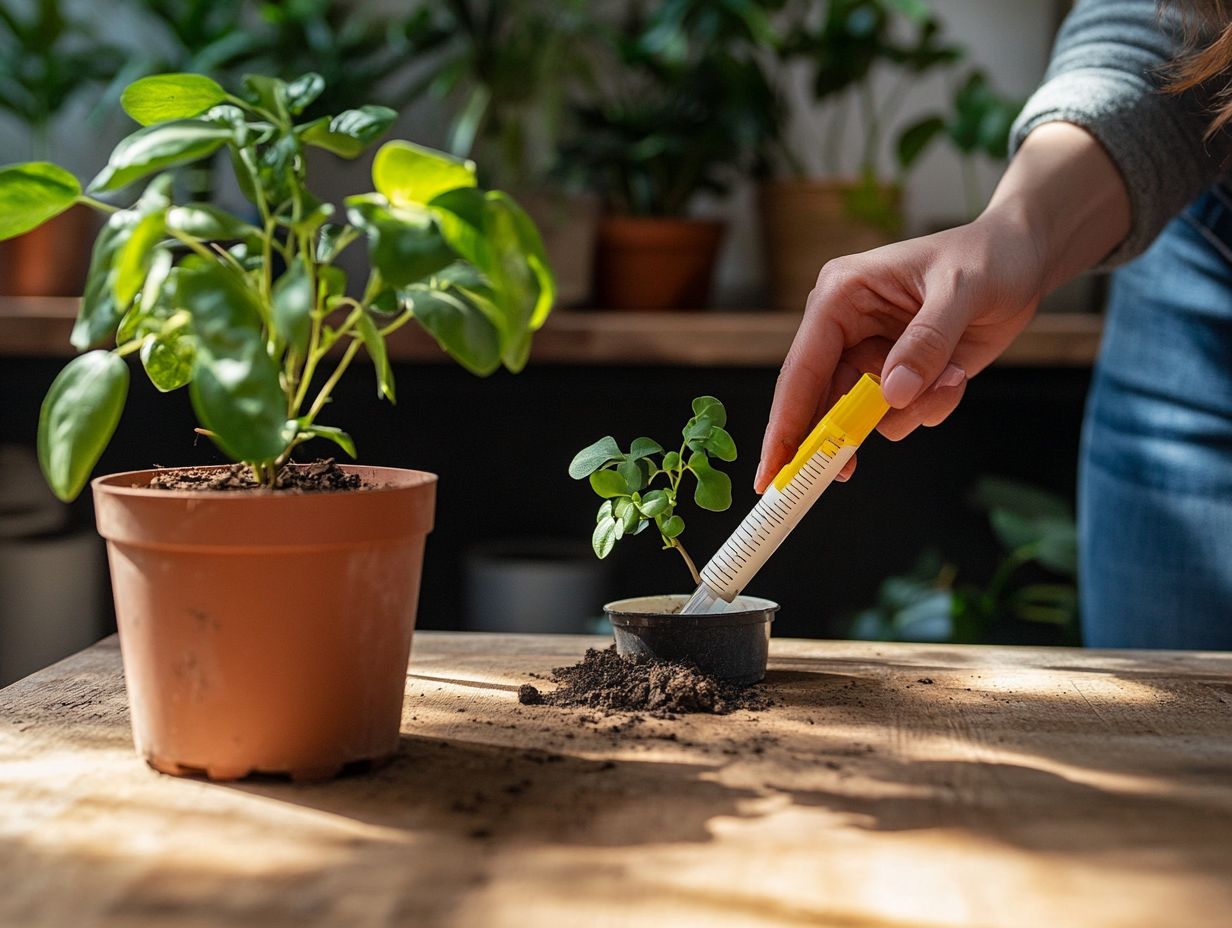
You have an array of options for testing soil quality at your disposal, including various gardening tools and methods. From straightforward DIY soil tests utilizing simple home methods to professional analyses that offer in-depth insights into pH levels, nutrient content, and soil structure, you can choose the approach that best suits your needs.
DIY Testing Kits
DIY testing kits offer a smart, cost-effective solution for assessing soil quality. They empower you to evaluate nutrient levels, moisture levels, and pH without relying on professional services.
These kits typically come equipped with essential components, such as test strips or color charts that deliver at-a-glance results. They also include soil probes for hassle-free sampling, making them handy gardening tools. To use them effectively, you simply need to collect soil from various spots in your garden, mix it thoroughly, and follow the provided instructions for accurate measurements. Additionally, consider exploring the top soil amendments for healthy indoor plants to enhance your gardening experience.
Key indicators measured by these kits include nitrogen, phosphorus, and potassium levels essential nutrients for your plants health. They also assess pH, which is important for how well plants can get nutrients. Some kits even evaluate organic matter content, offering valuable insights into your soil’s structure and its amendments.
By mastering these tools, you can make informed decisions that help your plants flourish. This leads to lush growth and vibrant blooms, enhancing your gardening confidence.
Professional Soil Testing
Professional soil testing offers you a detailed analysis of your soil s quality. It provides valuable insights into its ability to absorb nutrients and highlights the necessary amendments for optimal plant health.
This thorough assessment evaluates essential soil nutrients like nitrogen, phosphorus, and potassium. It also measures pH levels, organic matter content, and microbial activity, which refers to the presence and activity of microorganisms that help in nutrient breakdown. Understanding these factors allows you to customize your approach when applying compost and other soil amendments.
With a clear grasp of your soil s unique composition, you can cultivate a thriving garden ecosystem. This enhances both yield and plant resilience, ensuring longevity in your gardening methods. Invest in a professional soil test today to transform your gardening practices and elevate your long-term sustainability efforts.
Interpreting Soil Test Results
Interpreting soil test results is essential for your indoor gardening success. This process provides the foundation for effective gardening advice. It allows you to grasp nutrient levels, understand the pH conditions, and identify the necessary adjustments needed to enhance soil quality.
With this knowledge, you can create the ideal environment for your plants to thrive.
What Different Measurements Mean
Different measurements from soil test results can unveil essential insights. They help identify nutrient levels that might lead to overwatering issues or deficiencies in your indoor plants, directly affecting their survival.
For instance, pH levels are pivotal. Many houseplants flourish in slightly acidic conditions, typically between 6.0 and 7.0, ensuring optimal soil conditions. If the pH drifts too far from this optimal range, it can obstruct the plant’s ability to absorb vital nutrients like nitrogen, potassium, and phosphorus.
Take spider plants, for example; they thrive within this pH range. A pH imbalance could stunt their growth and affect their overall health. Likewise, maintaining an ideal nitrogen level encourages lush foliage, while potassium supports root health and flower production, as seen with peace lilies.
By monitoring these metrics, you can ensure meticulous management of water and nutrients. This directly impacts the vitality and aesthetic appeal of your indoor greenery and the overall success of your gardening methods.
Improving Soil Quality for Indoor Plants
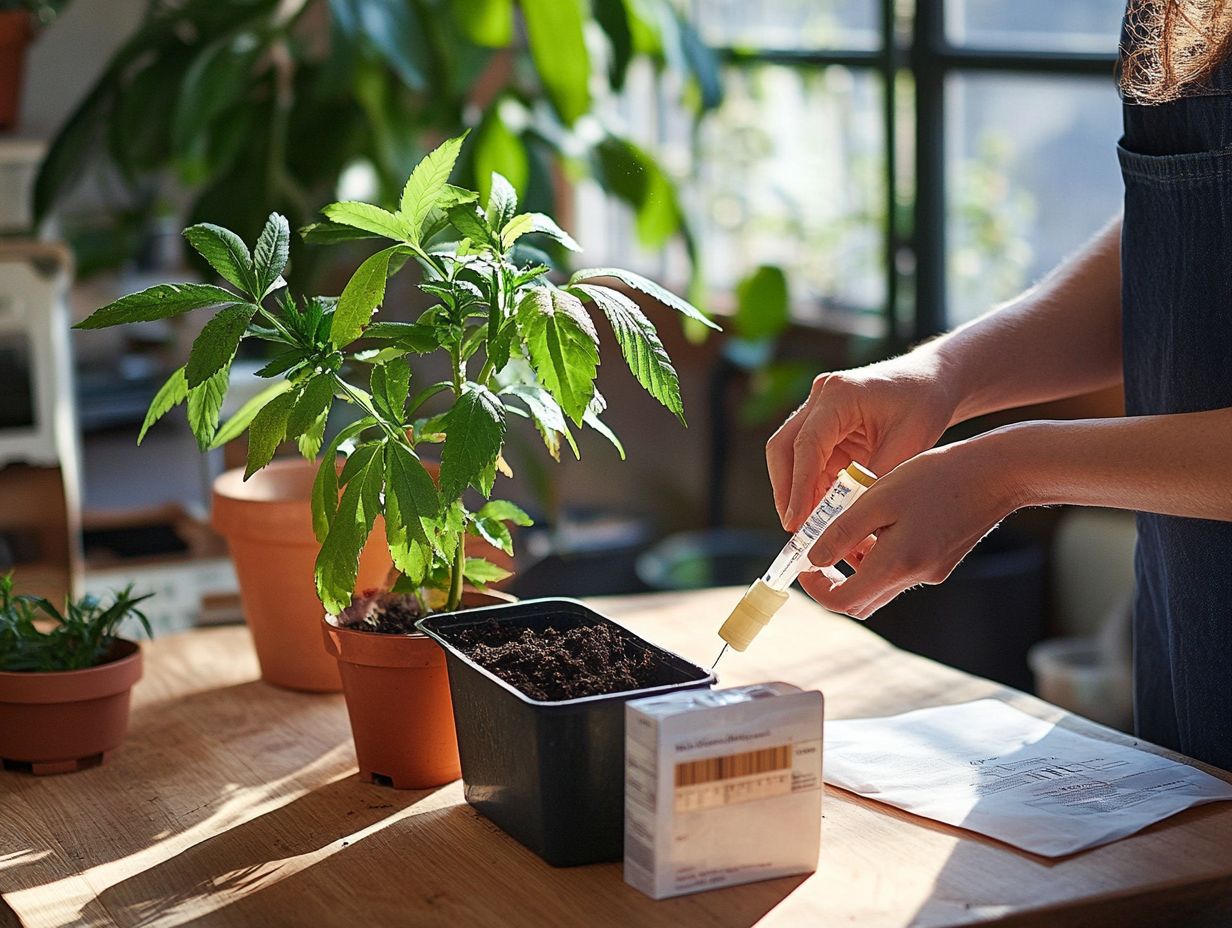
Enhancing soil quality for your indoor plants requires effective amendments and practices that improve the overall health of the soil. Healthy soil is fundamental for plant growth and paves the way for robust plant growth, creating a vibrant indoor garden.
Effective Soil Amendments
Essential soil amendments like compost and peat moss boost soil quality in your container gardens. They provide necessary nutrients and improve moisture retention, setting the stage for thriving plants.
These organic materials not only enhance soil fertility, but also promote a healthy balance of bacteria and other organisms in the soil critical for your indoor garden’s resilience. To achieve the best results, it’s important to know what to know about soil for houseplants. Incorporate vermiculite and perlite to improve aeration, ensuring your plant roots receive adequate oxygen and drain excess water efficiently.
Mix them well to maximize their benefits! For your indoor plants, a blend of compost and perlite creates the ideal potting soil, promoting drainage while retaining essential moisture. Start by assessing your current soil quality, then gradually incorporate the amendments for understanding soil pH for indoor plants to ensure balanced growth.
Tips for Maintaining Healthy Soil
Maintaining healthy soil is vital for nurturing vibrant indoor plants. You can achieve this through simple gardening tips that ensure proper watering routines and balanced soil nutrients.
To create a thriving environment, focus on adequate drainage to prevent waterlogging and root rot. Regular soil testing helps you determine nutrient levels and pH balance, allowing for necessary adjustments that promote growth.
Adjust your watering schedules based on the season and your plants’ needs. Incorporating organic matter, like compost, enriches soil structure and promotes beneficial microbial activity.
By paying close attention to these elements, you can cultivate a robust foundation for your green companions. This will result in a lush indoor garden that flourishes beautifully!
Frequently Asked Questions
Why should you test your indoor plant’s soil quality?
Testing soil quality is important because it allows you to determine the nutrients present, pH levels, and moisture content critical for healthy plant growth.
How can I test the pH level of soil for my indoor plants?
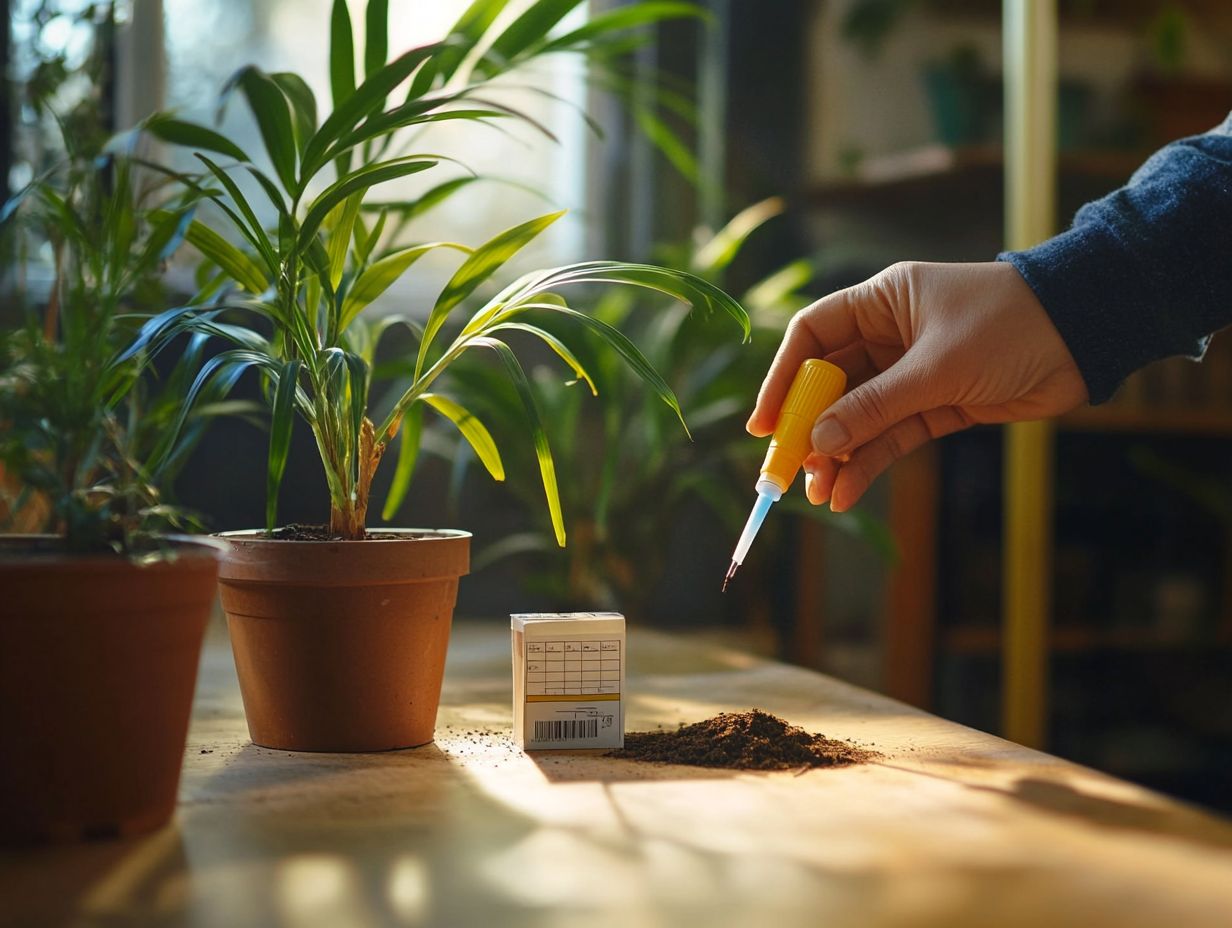
You can test the pH level of soil for your indoor plants using a pH testing kit available at gardening stores or online. Follow the kit’s instructions for an accurate reading.
What are the signs of poor soil quality for indoor plants?
Signs of poor soil quality include yellowing or wilting leaves, stunted growth, and pests or diseases. These symptoms can indicate a lack of nutrients, improper pH levels, or excessive moisture in the soil.
Can I use the same soil for all my indoor plants?
No, different plants have unique soil requirements. Some need well-draining soil, while others require more moisture retention.
How often should I test the soil for my indoor plants?
It’s recommended to test your soil at least once a year or whenever you notice signs of poor soil quality. This helps you make necessary adjustments to ensure your plants receive the nutrients they need!
What can I do to improve the soil quality for my indoor plants?
Enhance the soil for your indoor plants by adding organic matter like compost or fertilizer. This provides essential nutrients they need to grow strong.
Change the soil’s acidity by adding materials such as lime or sulfur. A balanced pH level creates a healthier environment for your plants!

